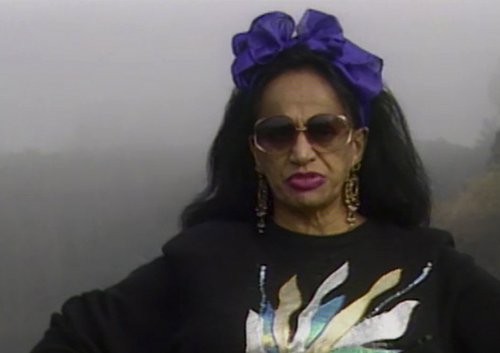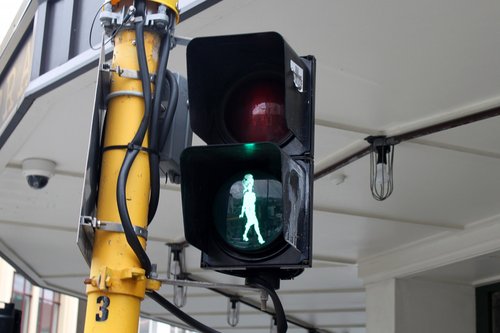
Walk down Cuba Street in Wellington and you’ll see the little green man at the pedestrian crossing is actually a silhouette of the elegant Carmen, with heels and a large headdress. Carmen Rupe (1936 – 2011) was an entertainer, café owner, sex worker and the most prominent transgender woman of her time. Long before her likeness was captured in lights, this remarkable woman reflected on her life in the 1989 documentary Carmen, directed by Geoff Steven. In collaboration with the National Library, a screening of the documentary during the 2020 Wellington Pride Festival was followed by an engaging panel discussion reflecting on her enduring legacy.
Appropriate for a green light, Carmen was a trailblazer who pushed against conservative New Zealand society. A flamboyant fixture on Cuba Street in the late 1960s and 1970s, she ran for Wellington mayor in 1977. She campaigned to lower the drinking age to 18, keep bars open until midnight, make prostitution legal, decriminalise homosexuality and introduce sex education into schools.
Hero image: Framegrab of Carmen Rupe from the documentary 'Carmen'.

The 'Carmen Rupe' pedestrian crossing light on the corner of Cuba and Vivian Streets, Wellington.
A Magical Memory Tour
In Carmen the story of this larger-than-life personality is told through a playful blend of campy flashbacks and interviews. A camera follows Carmen as she tours places that evoke vivid memories – her hometown of Taumarunui, places she used to work and streets she frequently walked. Standing on an Auckland street, Carmen recounts how she always enjoyed wearing women’s clothes and tells how in 1966 she was arrested for doing so in public. The case was dismissed and from that moment she never wore men’s clothes again. A fantasy sequence shows a young Carmen (played by Mika Haka) doing a hula in an understated, conservative black suit. As the dancing continues, the clothes become more colourful and relaxed. Feminine elements are added – a skirt, a lei, make-up, longer hair – until Carmen appears in a full hula outfit with a floral bra. The dance ends with Carmen in an elegant cocktail dress with a striking blue necklace. In this symbolic transformation Carmen comes into her own.
Excerpt from 'Carmen'.
This cinematic celebration of Carmen features a few more familiar names and faces. Dalvanius Prime – part of the team behind the 1984 Pātea Māori Club hit “Poi E” – composed the film’s soundtrack. Georgina Beyer, New Zealand’s first transgender Member of Parliament, also makes an appearance in the film. Before venturing into politics, Georgina was an actress and sex worker. Carmen also makes an appearance in Georgina’s 2001 documentary Georgie Girl.
Paewhiri Kōrero on Gender Fluidity and Identity
In March 2020, just before lockdown, Ngā Taonga and the National Library hosted a screening of Carmen followed by a panel discussion. Facilitator Gareth Seymour asked panelists Tauputuariki Brightwell, Tuiloma Samu, Richard Tankersley, Peri Te Wao and Karen Te Wao to reflect on the film and add their own personal memories of Carmen. A true rangatira, Carmen is remembered for the ways she wove together a community and helped people be more comfortable with themselves.
Q&A Footage from the panel discussion held by Ngā Taonga and the National Library.
Richard Tankersley extends this idea of being comfortable with ourselves and accepting of others through his definition of identity. Identity is comprised of many threads – gender, sexual orientation, ethnicity and many others all combine in different ways. He says, ‘We are all our own normal… We make connections with each other by identifying with at least some parts of other people’s normal.’
The next time you’re on Cuba Street and Carmen gives you the green light to cross the street, take a moment to look around and appreciate the diversity of your surroundings. After you cross the street you may even start to imagine the various threads that connect everyone – whether you do this through a campy flashback is up to you.
Richard Tankersley extends this idea of being comfortable with ourselves and accepting of others through his definition of identity.
About the Panel
Gareth Seymour (Panel facilitator) grew up in Tokoroa. After school he studied in Tāmaki Makaurau and Kirikiriroa and now lives in Te Whanganui-a-Tara. In four years at Ngā Taonga he has worked in a variety of roles supporting the contract with Te Māngai Pāho, and now holds the role of Poutaki Taonga Māori.
Karen and Peri Te Wao say you know you’re getting old when you appear in an iconic photo collage owned by Chrissy Witoko, displayed in her Evergreen Coffee Lounge in Vivian Street, Wellington. Like Carmen, Chrissy supported many people from all walks. In a way, that is also what we are about. We are kind people who celebrate our communities (Tapatoru and Tātou), in our way.
Taupuruariki (Ariki) Brightwell (Rongowhakaata, Ngāti Maru, Te Whānau–a–Ruataupare, Te Arawa, Ngāti Tūwharetoa, Ngāti Toa, Ngāti Raukawa. Ngā motu o Tahiti) is an Takatāpui Indigenous artist of Māori, Rarotonga and Tahitian descent. She devotes herself to art and storytelling, revolving around her history and tipuna. She is the 27th generation of an unbroken line of artists.
Tuiloma Lina-Jodi Vaine Samu (she/her) is a Samoan woman born in Aotearoa New Zealand. She was born, raised, educated and lived in Ōtāhuhu and Māngere, South Auckland. She is the fifth child of six of the late Tuiloma Molipopo Samu nee Iusitini of Sapunaoa, Falealili and Pu’apu’a Savai’I, Samoa and Leatufale Lila Samu of Salelesi and Faleula, Upolu Samoa. Formerly employed at Te Kāhui Tika Tangata, the NZ Human Rights Commission based in Auckland, she has now moved to Te Whanganui-a-Tara to work at the Ministry for Pacific Peoples as Principal Advisor for its newly established Pacific Languages Revitalisation Unit (putting to use her doctoral research).
Richard Tankersley is currently Principal Māori Advisor at the Royal NZ College of General Practitioners. From 2008 to 2017 he held the position of Human Rights Commissioner where his areas of experience were sexual orientation, gender identity and sex characteristics. For over 20 years Richard was the Diversity and Inclusion Consultant Facilitator at Matariki Services Ltd.